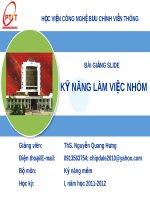Bài giảng kỹ năng làm việc theo nhóm
Bạn đang xem bản rút gọn của tài liệu. Xem và tải ngay bản đầy đủ của tài liệu tại đây (1.77 MB, 77 trang )
TEAMWORK SKILLS
"Working together as a team means winning
together as a team."
Group assignment
In exam room
To get her heart
Or to do a very importance thing..
"Coming together is a beginning...
Keeping together is progress...
Working together is a success."
Team
• “A distinguishable set of two or more
individuals
• who interact dynamically, interdependently
and
• adaptively to achieve specified, shared and
• valued objectives”
(Bowers, Clint A., et.al)
Team
• “Group of people with a full set of complementary
skills required to complete a task, job or project.
• Team members operate with a high degree of
interdependence, share authority and responsibility
for self-management, are accountable for the
collective performance and work toward a common
goal and share rewards.
• A team becomes more than just a collection of
people when a strong sense of mutual commitment
creates synergy, thus generating performance
greater than the sum of the performance of its
individual members.”
/>
Teamwork
A joint action by two or more people.
Each person has complementary skills.
Express individual interests and opinions.
To achieve common goals.
Teamwork
• “Teamwork is the definition of cooperative
members of a same group working together
to obtain the same goal.”
• “The process of working collaboratively with
a group of people, in order to achieve a goal.”
/>
Team Characteristics
• A team consists of two or more people who work
interdependently over some time period to
accomplish common goals related to some taskoriented purpose.
– A special type of “group.”
– The interactions among members within teams revolve
around a deeper dependence on one another than the
interactions within groups.
– The interactions within teams occur with a specific taskrelated purpose in mind.
Formal and Informal Groups
• Formal group
– formed by the organization.
– have designated work assignments and specific tasks.
– appropriate behaviors are established by and directed
towards organizational goals.
• Informal group
– formed by friends (friendships and common interests).
– are of a social nature.
– occur naturally in the work place in response to the
need for social contact.
Table 11-1
Types of Teams
Time
Stages of Team Development
Forming
• Forming - try to understand the boundaries in the
team and get a feel for what is expected of them.
Storming
• Storming - remain committed to ideas, triggers
conflict that affects some relationships and harms
the team’s progress.
Norming • Norming - realize that they need to work together
to accomplish team goals.
Performing
Adjourning
• Performing - members are comfortable working
within their roles, and the team makes progress
toward goals.
• Adjourning – members experience anxiety and
other emotions as they disengage and ultimately
separate from the team.
Tuckman’s Five-Stage Theory of Group
Development
Question?
A search committee has been created at ABC University
to hire a new dean of College of Business. During
which stage of the group development process
would the search committee address role
agreements and working as a team?
A. Storming
B. Performing
C. Adjourning
D. Norming
9-16
Team Interdependence
• Task interdependence refers the degree to which team
members interact with and rely on other team members
for the information, materials, and resources needed to
accomplish work for the team.
Pooled interdependence
- Requires lowest degree of
required coordination,
- Members complete their work
assignments independently,
and then this work is simply
“piled up” to represent the
group’s output.
Team Interdependence (Cont’d)
Sequential interdependence
- Requires different tasks to be done in a prescribed
order,
- Members interact to carry out their work, the
interaction only occurs between members who
perform tasks that are next to each other in the
sequence.
Team Interdependence, Cont’d
Reciprocal interdependence
- Requires members to be specialized to perform specific
tasks.
- However, instead of a strict sequence of activities,
members interact with a subset of other members to
complete the team’s work.
Team Interdependence (Cont’d)
Comprehensive interdependence
- Requires the highest level of interaction and coordination
among members.
- Each member has a great deal of discretion in terms of what
they do and with whom they interact in the course of the
collaboration involved in accomplishing the team’s work.
Goal Interdependence
• A high degree of goal interdependence exists
when team members have a shared vision of
the team’s goal and align their individual goals
with that vision as a result.
– Develop a formalized mission statement that
members buy into.
Outcome Interdependence
• A high degree of outcome interdependence
exists when team members share in the
rewards that the team earns.
– Pay, bonuses, formal feedback and recognition,
pats on the back, extra time off, and continued
team survival.
Team Composition
• Team
composition
is the mix of
people who
make up the
team.
Group Member Roles
9-24
Team and Individualistic Roles









